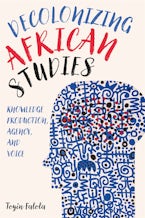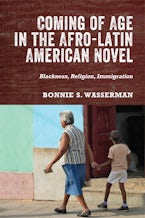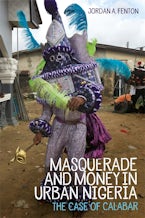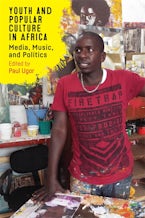
Title Details
292 Pages
22.8 x 15.2 cm
Series: Rochester Studies in African History and the Diaspora
Series Vol. Number:
60
Imprint: University of Rochester Press
Blood on the Tides (African Edition)
The Ozidi Saga and Oral Epic Narratology
- Description
- Reviews
PAPERBACK FOR SALE IN AFRICA ONLY
Examines the Ozidi Saga -- one of Africa's best-known epics -- as an example of oral literature and as a reflection of the specific social and political concerns of the Niger Delta.
The Ozidi Saga is one of Africa's best known prosimetric epics, set in the Delta region of Nigeria. Blood on the Tides examines the epic -- a tale of a warrior and his sorcerer grandmother's revenge upon the assassins who killed her son -- both as an example of oral literature and as a reflection of the specific social and political concerns of the Nigerian Delta and the country as a whole. In addition the book considers various iterations ofthe saga, including a performance of the entire saga in 1963 in Ibadan by the folk artist Okabou Okobolo, which was subsequently transcribed, translated, and edited by the renowned Nigerian poet, playwright, and scholar John Pepper Clark-Bekederemo. The study concludes with a look at the work of contemporary Nigerian creative writers and their connection to the powerful literary and historical currents of the Ozidi story.
Isidore Okpewho is Distinguished Professor of Africana Studies, English, and Comparative Literature at Binghamton University (SUNY). He is the author of The Epic in Africa, Myth in Africa, African Oral Literature, and Once Upona Kingdom. An award-winning novelist, he has published four titles: The Victims, The Last Duty, Tides, and Call Me By My Rightful Name.
Examines the Ozidi Saga -- one of Africa's best-known epics -- as an example of oral literature and as a reflection of the specific social and political concerns of the Niger Delta.
The Ozidi Saga is one of Africa's best known prosimetric epics, set in the Delta region of Nigeria. Blood on the Tides examines the epic -- a tale of a warrior and his sorcerer grandmother's revenge upon the assassins who killed her son -- both as an example of oral literature and as a reflection of the specific social and political concerns of the Nigerian Delta and the country as a whole. In addition the book considers various iterations ofthe saga, including a performance of the entire saga in 1963 in Ibadan by the folk artist Okabou Okobolo, which was subsequently transcribed, translated, and edited by the renowned Nigerian poet, playwright, and scholar John Pepper Clark-Bekederemo. The study concludes with a look at the work of contemporary Nigerian creative writers and their connection to the powerful literary and historical currents of the Ozidi story.
Isidore Okpewho is Distinguished Professor of Africana Studies, English, and Comparative Literature at Binghamton University (SUNY). He is the author of The Epic in Africa, Myth in Africa, African Oral Literature, and Once Upona Kingdom. An award-winning novelist, he has published four titles: The Victims, The Last Duty, Tides, and Call Me By My Rightful Name.
"Simply put, few other scholars possess the experience, knowledge, creativity, and, indeed, moral courage to do what Isidore Okpewho does here." RESEARCH IN AFRICAN LITERATURES
"[T]here is much of value in his account of the interplay between narrator, musicians, and audience in the performance of Ozidi, as well as the more nuanced hegemony of Benin over Ijo culture. This book thus makes valuable contributions to a field in which Okpewho has long played a major role." MODERN PHILOLOGY
"[I]t argues for the artistry of oral literary performances, and ultimately demonstrates that the epic of Ozidi, in effect the genre at large, transcends art, and makes a commentary on and offers an insight into the socio-politics of a people." AFRICAN STUDIES QUARTERLY
"A labor of love from the distinguished expert on African oral literature, Isidore Okpewho. With sophisticated textual analysis, this work provides social, historical, and political context for The Ozidi Saga. A bonus is his concluding chapter, which not only historicizes but also contemporizes and globalizes the saga, bringing it into conversation with challenges facing contemporary Nigeria. --" Carole Boyce-Davies, Professor of English and Africana studies, Cornell University
"Okpewho taught a generation of scholars to recognize the pleasures and pressures of the aesthetic impulse in African cultures. In this powerful new book, he continues to teach us. Blood on the Tides is a serene tour de force. --" Olakunle George,associate professor of English and Africana studies, Brown University
"No one knows more, or has written more intelligently, about African oral and written narrative than Isidore Okpewho. In Blood on the Tides he brings together both traditions, along with his equally great knowledge of the cultural contexts from which both derive. Okpewo's book is a magnificent achievement, beautifully written and rich in traditional and scholarly wisdom. --" Bruce Jackson, SUNY Distinguished Professor and James Agee Professor of American Culture, SUNY Buffalo
"In all the literature on epics, there is no broader and deeper account of the forces that shape a performance. The voices of the narrator, his chorus, and his audience combine to create a world that is partly mythic, partly historical, and partly contemporary in this masterpiece of the art of interpretation. --" Dennis Tedlock, author of 2000 Years of Mayan Literature
Title Details
292 Pages
2.28 x 1.52 cm
Series: Rochester Studies in African History and the Diaspora
Series Vol. Number:
60
Imprint: University of Rochester Press




















